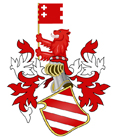Hrana Vukovic
Serbian Duke Hrana Vukovic Kosaca master of the upper Podrinje, Dabra and Hum. Younger brother of Serbian Duke Vlatko Vukovic Kosaca. Faithful knight and protector of the Principality of Herzegovina. Father of the Grand Duke of Serbia Sandalj Hranic Kosaca, Prince of Serbia Vukac Hranic Kosaca and Prince of Serbia Vuk Hranic Kosaca.
Year of birth: unknown
Place of birth: Kosace
Father’s name: Serbian Duke Vuk Kosaca
Mother’s name: unknown
Wife: Teodora
Descendants: Serbian Duke Sandalj Hranic Kosaca, Serbian Prince Vukac Hranic Kosaca, Serbian Prince Vuk Hranic Kosaca (my direct ancestor)
Religious affiliation: Orthodox Christian
Year of death: 1388
Serbian Duke Hrana Vukovic Kosaca was born in Kosaca on the slopes of the Drina River. He was born as the second son of the Serbian duke Vuk Kosaca. The period of the duke’s growing up is shrouded in secrecy because there are no historical documents that would shed light on that.
The religious affiliation of the Serbian duke Hrana Vukovic Kosaca was unequivocally the Orthodox Christian religion. All this is indicated by Istrian documents, as well as the temples that were built by the Kosaca family along the upper course of the Drina River, as well as throughout the Principality of Herzegovina. Serbian Duke Hrana Vukovic Kosaca, like his brother, Serbian Duke Vlatko Vukovic Kosaca, practiced communion in the temples of the Serbian Orthodox Church before the great battles. Duke of Serbia Hrana Vukovic Kosaca lived and was buried according to the customs of the Serbian Orthodox Church. He passed this faith on to his sons, the Serbian duke Sandalj Hranic Kosaca, the Serbian prince Vukac Hranic Kosaca and the Serbian prince Vuk Hranic Kosaca (my direct ancestor).
One thing is for sure, the Serbian duke Hrana Vuković Kosaca grew up with his father, a great warrior and ruler. Along with him, he learned the necessary skills of governing and negotiating, as well as the warrior skills that were necessary at that time in order to survive. He also loved hunting as much as his father.
He grew up in the shadow of his brother, the Serbian duke Vlatko Vukovic Kosaca, who was destined to inherit the throne by birth as the eldest son.
After the death of his father in 1359, both brothers took part of the responsibility for leading the duchy of the Kosaca family. Considering that the Serbian duke Vlatko Vukovic Kosaca started wars and conquests very early, the younger brother of the Serbian duke Hrana Vukovic Kosaca stayed in Kosaca to protect and defend the throne. He was a faithful defender of the small duchy.
The first time it was mentioned in official documents was in 1378 in the charter of the King of Bosnia, Tvrtko I.
He is mentioned as a witness in the charter of King Tvrtko I from 1378
It is also mentioned in Venetian documents from 1378
Serbian Duke Hrana Vukovic Kosaca was in charge of guarding the throne and the northern territories. Since he was younger and at the beginning he could not accompany his brother in war campaigns, but he performed the necessary duties in his hometown of Kosaca.
Frequent incursions of the Hungarian army into the area around the river Drina, which controlled the Kosaca family, demanded adequate answers. Serbian Duke Hrana Vukovic Kosaca took part in those brackets. Protecting the place where they live and protecting the people who were constantly under attack by robbers and bandits.
Serbian Duke Hrana Vukovic Kosaca had three sons.
The first son, Serbian duke Sandalj Hranic Kosaca was born in 1370
The eldest son Sandalj was named after his godfather from the Dubrovnik region. Serbian Duke Sandalj Hranic Kosaca was raised and prepared to take over the throne.
The second son, was the Serbian prince Vukac Hranic Kosaca in 1372
The middle son Vukac is a coin named after his grandfather Vuk Kosaca. Vukac was the father of the great duke of St. Sava, Stefan Vukcic Kosaca
The third son was the Serbian prince Vuk Hranic Kosaca in 1374.
The youngest Vuk was named after his grandfather Vuk Kosaca. It was an unwritten rule that the youngest was named after his grandfather. Since he was the youngest, he received the least benefits and had to fight for his place in the hierarchy. Serbian Prince Vuk Hranić Kosaca was the father of Prince Ivan Vukovic Kosaca (my direct ancestor) and Serbian Prince Sladoje Vukovic Kosaca.
The most famous battle in which the Serbian duke Hrana Vukovic Kosaca took part took place in 1386 against the Turkish invaders. Frequent incursions by the Turkish army, which plundered and destroyed the villages around the Drina, were opposed by the army of the Serbian duke Vlatko Vukovic Kosaca. In 1386, a major incursion of the Turkish army took place in the place of Rudina. A great battle took place. The army of the Serbian duke Vlatko Vukovic managed to defeat the Turkish army and stop the looting and destruction in the area of Rudine.
It was an overture before the conquest of the Turkish army in the Balkans.
The great conquests began in 1463 with the invasion of that very area in the town of Ustikolina, where two great battles would take place. The first in the village of Josanica near Foca and the second in the village of Presjeka near Ustikolina.
Serbian Duke Hrana Vukovic Kosaca was wounded in those wars. He died of severe wounds.
The army of the Serbian duke Vlatko Vukovic Kosaca clashed with great force and bravely entered into conflicts, protecting their country and defending their people.
It can be said with high probability that the duke is Serbian and Hrana Vukovic Kosaca died in 1388, before the death of his brother (1393), the Serbian duke Vlatko Vukovic Kosaca. He fought for the Kosaca family all his life and died as a faithful knight of the Kosaca family.
DOCUMENTATION:
